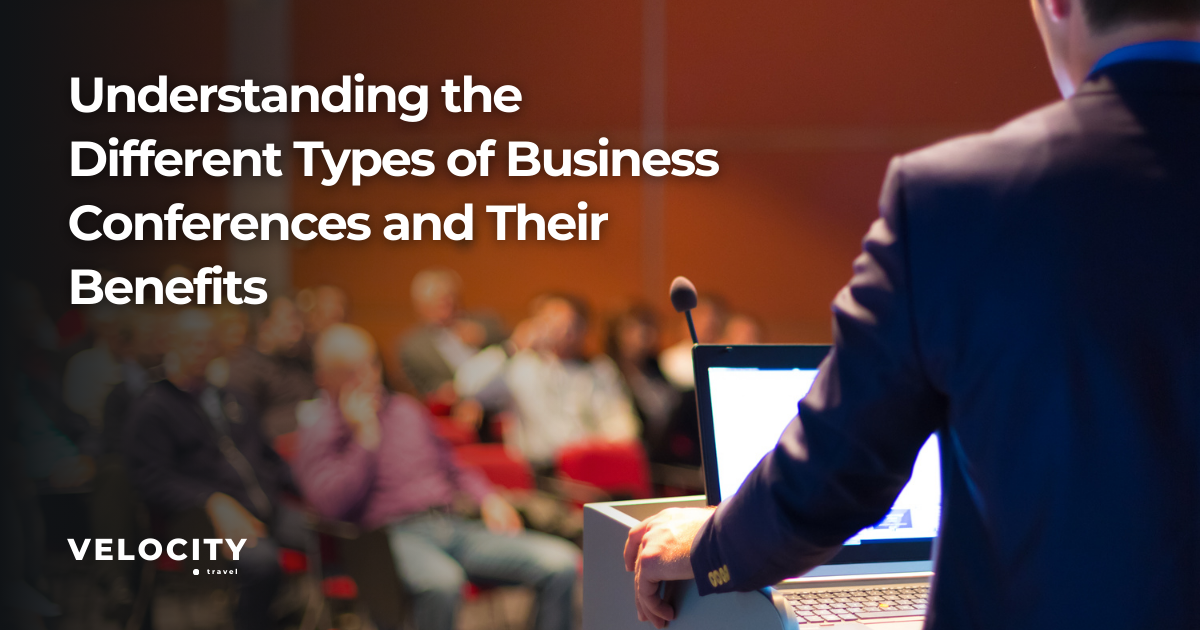Business conferences play a crucial role in today’s corporate landscape. Understanding the types of business conferences and their respective benefits can significantly improve how organisations approach these events.
Table of Contents
ToggleWhether you’re a finance team, HR manager, or part of the administration team, knowing which conference type suits your business objectives is key to making the most of these opportunities.
In this article, we’ll explore the different kinds of business conferences, highlighting their benefits and offering insights into how they can enhance collaboration, foster innovation, and lead to organisational growth.
By the end, you’ll have a deeper understanding of the types of corporate events and how to leverage them to achieve your goals.
The Importance of Business Conferences
Before diving into the types of business conferences, let’s first understand why they are important. Business conferences bring together professionals from various sectors to share knowledge, network, and discuss trends in their respective industries. Whether in person or virtual, these conferences offer a valuable space for learning and growth.
For example, a report by Harvard Business Review highlights that 70% of professionals consider networking at conferences to be a critical factor in their career development. Additionally, conferences provide an excellent platform for expanding a company’s visibility, forming partnerships, and exploring potential investments.
Types of Business Conferences
The different types of business conferences are as follows:
1. Industry-Specific Conferences
Industry-specific conferences focus on particular sectors such as finance, technology, healthcare, or retail. These conferences bring together professionals, thought leaders, and innovators within the same industry, facilitating meaningful conversations that are directly relevant to their field.
Benefits:
- Deep Industry Insights: Attendees gain access to the latest trends, technologies, and strategies tailored to their sector.
- Networking Opportunities: These events provide a concentrated environment for forging connections with like-minded professionals and businesses.
- Knowledge Sharing: Industry-specific conferences often feature speakers who are experts in the field, allowing attendees to learn from the best.
For example, Velocity Travel is a key player in the travel industry, offering business solutions that include corporate travel management services. Their expertise could be valuable in business travel-related conferences.
2. Corporate Conferences
Corporate conferences typically focus on broader business topics such as leadership, organisational development, and company growth. These events often feature multiple tracks or sessions that cater to different levels of expertise and areas of interest within a corporation.
Benefits:
- Leadership Development: Corporate conferences often include workshops and keynote speeches from successful business leaders, which can inspire and educate your organisation’s management team.
- Team Building: These events can be a great way for your HR team to plan team-building exercises, fostering better internal communication and collaboration.
- Strategic Planning: Attendees can gain new insights into business strategy, making these conferences a valuable investment for your organisation’s future.
3. Trade Shows and Exhibitions
Trade shows are another form of corporate conference types that focus on showcasing products, services, and innovations within specific industries. Exhibitors typically set up booths to display their latest products, while attendees gain hands-on experience and insights into new offerings.
Benefits:
- Product Visibility: Trade shows offer an opportunity for businesses to showcase their products and services to a wider audience, helping increase brand awareness and sales leads.
- Customer Feedback: Trade shows allow organisations to interact directly with customers and potential buyers, providing valuable feedback that can help refine their offerings.
- Partnership Opportunities: Exhibitions often lead to new partnerships, distributors, and suppliers.
4. Seminars and Workshops
Seminars and workshops are smaller-scale business conferences that focus on specific topics, such as HR practices, financial management, or marketing strategies. These events typically involve in-depth discussions, case studies, and group activities aimed at improving skills and knowledge.
Benefits:
- Specialised Learning: These events are excellent for businesses that want to focus on a particular area of development, such as employee training or process optimisation.
- Hands-on Experience: Workshops often include practical, hands-on exercises, making them ideal for team members who need to develop new skills.
- Increased Productivity: Seminars that focus on increasing workplace efficiency and improving professional skills can lead to greater productivity and employee satisfaction.
5. Webinars and Virtual Conferences
With the rise of digital technologies, virtual business conferences such as webinars have gained popularity. These online events allow businesses to gather and share knowledge remotely, making them more accessible for global teams.
Benefits:
- Global Reach: Virtual conferences are an excellent option for businesses with a global presence, enabling employees from various locations to participate without the need for travel.
- Cost-Effective: Since virtual conferences don’t require physical venues, travel, or accommodation, they are more cost-effective than in-person events.
- Flexibility: Webinars and online events are often recorded, giving participants the flexibility to watch sessions at a convenient time.
6. Networking Events and Meetups
Networking events and meetups are informal business conferences that allow professionals to meet in a relaxed setting, often over dinner or drinks. These events provide a platform for informal discussions and relationship-building.
Benefits:
- Informal Networking: These events are great for creating long-term business relationships without the pressure of formal presentations or sales pitches.
- Knowledge Sharing: While less structured than other types of conferences, networking events often lead to valuable knowledge exchange between participants.
- Collaboration Opportunities: Casual meetings can often lead to joint ventures, partnerships, and collaborations that benefit both parties.
7. Product Launch Events
Product launch events are typically held to introduce a new product or service to the market. These events often feature live demonstrations, keynote speakers, and media coverage to generate excitement about the new offering.
Benefits:
- Brand Awareness: A successful product launch event can generate significant media coverage, boosting your brand’s visibility and attracting new customers.
- Customer Engagement: These events offer a chance to interact directly with potential customers, answering questions and generating buzz around the product.
- Market Feedback: Product launches often include surveys or customer interviews, providing valuable feedback to improve the product further.
8. Leadership Retreats
Leadership retreats are exclusive, high-level conferences designed for senior executives and business leaders. These events typically focus on leadership development, strategic planning, and organisational vision.
Benefits:
- Strategic Planning: Leadership retreats allow senior management to step away from day-to-day operations and focus on long-term planning and strategy.
- Leadership Skills Development: These retreats offer leaders an opportunity to reflect on their leadership styles, improve decision-making, and enhance team dynamics.
- Company Vision Alignment: Senior leaders use these events to align their vision and goals, ensuring that everyone is on the same page.
Choosing the Right Conference for Your Organisation
With so many types of business conferences available, choosing the right one for your company depends on your business needs and objectives. Here are a few factors to consider when making your decision:
- Objectives: What do you hope to achieve from attending the conference? Are you looking to build relationships, learn new skills, or showcase a product?
- Target Audience: Who will benefit from attending? A finance team may find value in a financial strategy conference, while an HR department may benefit more from a leadership development event.
- Budget: Consider the cost of the conference, including travel, accommodation, and registration fees.
- Size and Scope: Larger events may offer more networking opportunities, but smaller events may provide a more focused and intimate learning environment.
Velocity Travel, which offers comprehensive corporate travel management services, can help streamline the logistics of attending or organising conferences. Their expertise in planning corporate travel ensures your team can attend events with minimal hassle, freeing up resources to focus on the business objectives at hand.
Summing Up
Understanding the different kinds of business conferences and their benefits is essential for making informed decisions about your organisation’s event strategy. Whether you are looking to improve your team’s skills, network with industry leaders, or showcase your brand, there’s a conference type suited to your needs.
By selecting the right event, businesses can unlock numerous opportunities, from leadership development to customer engagement and beyond. As you plan for the future, consider the role that these conferences can play in driving your organisation’s growth and success.
For companies seeking efficient and seamless travel management for attending business conferences, Velocity Travel offers a range of services that can help maximise the benefits of these valuable events.
FAQs
- What are the different types of business conferences?
The types of business conferences include industry-specific conferences, corporate conferences, trade shows, seminars and workshops, webinars and virtual conferences, networking events, product launch events, and leadership retreats.
- How do industry-specific conferences benefit businesses?
Industry-specific conferences offer deep insights into sector trends, provide networking opportunities with like-minded professionals, and facilitate knowledge sharing through expert-led sessions.
- What advantages do corporate conferences provide to organisations?
Corporate conferences focus on leadership development, team building, and strategic planning, contributing to organisational growth and improved internal communication.
- How can trade shows and exhibitions enhance a company’s market presence?
Trade shows and exhibitions allow companies to showcase products, gather customer feedback, and explore new partnerships, thereby increasing brand visibility and sales opportunities.
- What are the benefits of attending webinars and virtual conferences?
Webinars and virtual conferences offer global reach, cost-effectiveness, and flexibility, enabling businesses to access valuable content and networking opportunities remotely.

